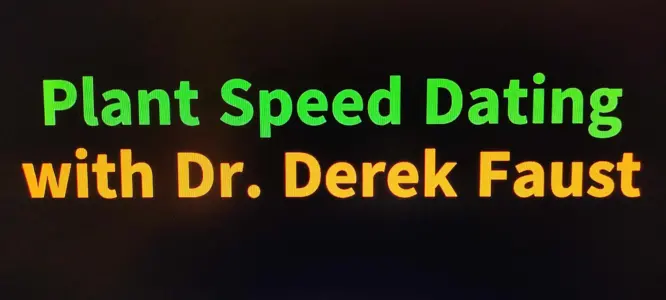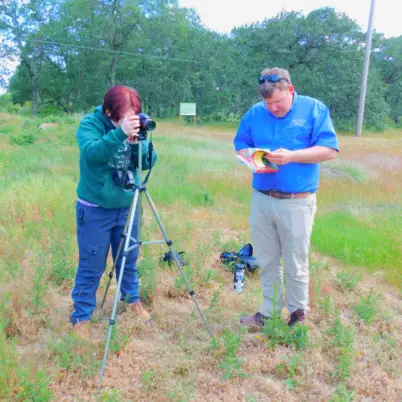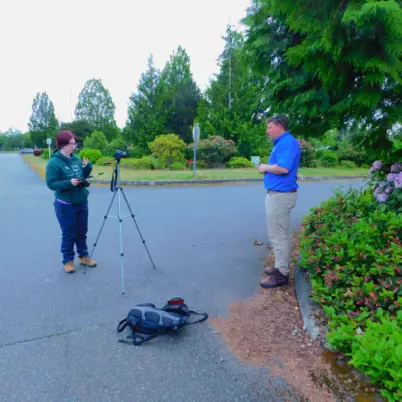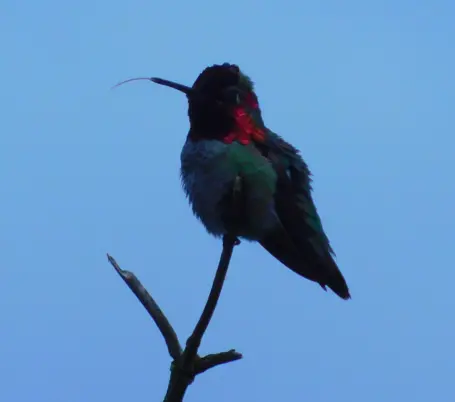Introducing Plant Speed Dating with Dr. Faust

An Innovative Approach to Environmental Literacy
by Marcia Wilson
“Ok, so this is probably the nerdiest thing I’ve ever seen anyone do when planning a conference, and after nearly seven years at the University of Cambridge, that’s really saying something.”—Jonathan Lawson, Getting Together: Science Speed Dating
This spring, Professor Faust’s desire to introduce more people to “The Flett” prompted him to start a series that employs the same concepts as speed dating.
Speed date… a plant?
Speed dating was introduced in 1998 as a way for young singles to meet a lot of eligible matches in a short period. The rules for Speed Dating are simple. Over a short period of 2-8 minutes, people casually interact in a ‘fast-motion’ conversation and trade large amounts of information about themselves. When the time is up, the participants may pursue their curiosity with each other or move on to something else. It is completely their choice. The rapid progression adds the element of fun and urgency to the exchange of information, almost like a game show.
As with meeting new people, Plant Speed Dating is intended to provide a high level intro. When it is over, the visitor can walk away, satisfied with the new knowledge nuggets, or they may find their intellectual appetites have been whetted. The goal is to convey just enough about the plant to give people access to pursuing further knowledge. CPTC students will find themselves equipped with a foundation to identify and work with the plant in their future career, while community members may experience an “aha!” moment that opens opportunities for independent learning.
Jumping into the fray

Environmental Science students test on accurate identification and knowledge of the native and non-native plants in Pierce County. How many? Thankfully not all: there are over 3,700 taxa (groups) of plants in Washington State! And of these, more than 2,650 are natives! The minute fraction in the Associate’s and Bachelor’s programs are chosen for their relevancy in the workforce.
Time is a precious of resource for anyone. Dr. Faust is developing Speed Dating with Plants create a learning platform that specifically acknowledges students’ needs. While books, podcasts, reels and videos abound, figuring out what to pay attention to and what is OK to ignore can gobble up time. Speed Dating with Plants is intended to pique curiosity while provide foundational knowledge.
On June 27, 2024, Dr. Faust and a two-person skeleton crew headed onto The Flett to set up “introduction videos” for 8-10 plants. A few hours and nine short films later, the inaugural “speed dates” will introduce viewers to native species salal, Garry Oak, Douglas Fir, Snowberry, and Ocean Spray, plus some non-native species of concern Himalaya Blackberry, Foxglove, and St. John’s Wort.
The first film is for the Garry Oak, the quintessential emblem of the uplands of the Outdoor Lab. In it, he breaks down the common and Latin names, leaf identification, the fruits (acorns), and its ecological niche.

Where else is speed dating used?
As a game, joke, or even as an educational lesson, “speed dates” as a way to quickly exchange information are here to stay.
Possible reasons to use speed dating: Encourage all students to interact with each other and foster a sense of community. Allow students to build fundamental knowledge or probe deeper with more open-ended questions. Allow quieter students an opportunity to speak in a partner setting.—Harvard University
Chemistry students often find themselves in a classroom version of speed dating in the beginning of their quarters. Professor Stokes employs it to develop familiarity, which in turn improves the working relationships of teamed projects and lab activities. In them, the students face off and talk for about two minutes for each session. Since the majority of chem students will move on to medical cohorts, the hope is that they will become comfortable with their classmates in the program and hone their professional skills in the field.
Dr. Faust hopes to use the same approach for his students. Familiarity with the team builds trust, increases attention, and decreases the odds of accidents. Like anything else, plants can be dangerous if not understood or treated without respect.

Please stay tuned as the “Speed Dating with Plants” videos post online!
“Historically, the meeting of strangers has been more than just a casual encounter; it has been a gateway to cultural exchange and adaptation. This phenomenon has been crucial in shaping societies, influencing everything from cuisine to language.”–Timeleft